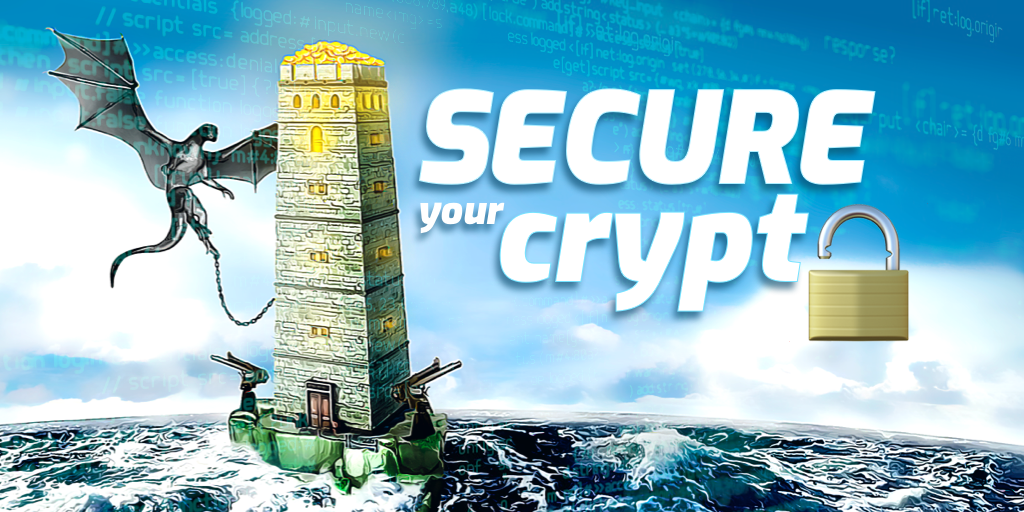
Cryptocurrencies can be used as investments, to conclude transactions, to make purchases, etc.
But these can also become a source of concern for their owner. In recent years, with the increasing number of cryptocurrency users, the number of theft operations and scams has increased considerably.
Today we are going to present you different steps to follow in order to secure your assets in the best possible way.
📱 Two Factor
🔠 Recovery phrase
🔑 private Keys
⛔️ Do not share
🏰 Good Storage
💉 Antivirus
🎣 Beware of Phishing
Two-factor authentication
Most online platforms using crypto-currencies offer 2 -Factor-Authentication (2FA). The identification to the platforms and sometimes even the operations (buy/sell order, withdrawal, funds transfer) are thus secured by a second one-time code sent by SMS, email or on an App of your choice (Google Authenticator or Authy for example).It is without doubt one of the most efficient tools to protect your funds. With the accessibility given today to 2FA you have no more excuses not to activate the double authentication!
Recovery phrase (or security phrase)
Most cryptocurrency wallets invite you to keep a recovery phrase, a list of words that will allow you to retrieve your private keys (Reminder: a cryptocurrency wallet is materialized by private keys that allow you to sign transactions on the blockchain).This technique is often used to synchronize wallets between several devices, and gives you a chance to retrieve your keys if by misfortune, you were to misplace them.The recovery phrase must be protected in a safe place (noted on paper, in a safe for example). The recovery phrase should be kept in a safe place (e.g. in a safe). If this phrase is ever found by someone with bad intentions, they could use it to empty your wallets.
Manage your private keys
We talked about it before, but no matter what services you use, knowing for sure where your encryption keys are stored is a golden rule.This is an important question to ask yourself before choosing a wallet. Don't hesitate to ask about the different services even if they are recommended to you. In general, we advise you to keep your private keys on your own devices and avoid leaving them lying around on tools you don't control. (Public PC)
Do not share your private keys!
In general, your private keys must remain private, do not share them! Neither on networks (Facebook, reddit, instagram...), nor on the cloud (DropBox, icloud, and other cloud backup services) and avoid even transmitting them by email. And even more, do not enter your private keys on tools that you do not know, a site asks you for your key to unlock a wallet, check twice before doing so because many fake sites (as well done as the real ones) take advantage of the lack of knowledge of some investors to retrieve the data and empty the wallet of them.
Cold Storage or Offline Storage
Online wallets and platforms are not infallible. Leaving your private keys on centralized servers for long periods is not recommended. If your goal is long term, there are many secure solutions, including ledger, which we no longer present. You can find alternatives to ledger at Trezor or CoolWallet.
Antivirus, computers and smartphones
The majority of thefts take place on poorly secured addresses, without double authentication, via a virus or malware (keylogger type) installed on your devices without you being aware of it.- Make sure your operating system is up to date and secure.- The installation of antivirus software adapted to your use is essential.
Today, smartphones are not spared, as a general rule, secure any device with which you perform actions on your crypto-currency assets.Scan these regularly to ensure the integrity of your hardware.
Phishing
This is the most devious method and probably the most profitable method for scams of all kinds, phishing consists of pretending to be an organization you trust (Binance, Coinbase, or kryll for example) with an email address or an account that seems to be official but is actually a fake account. Once you're in their net, it's hard to escape, phishing scams focus on human error, 99% of the time it's a scam that can be avoided with some simple techniques. Don't connect your wallets to sites you don't know, or that seem suspicious, never trust messages that come to you, usually a project will never contact you directly. Some sites like Binance allow you to edit a very specific word that appears in their official emails, if the chosen word does not appear there is a good chance that it is a phishing attempt.
Conclusions
As you will have understood security is the point not to neglect in crypto-currencies, by following the different recommendations of this article you will be ready to face any kind of attack against your assets.
Don't forget : Not your key Not your coins
Happy Trading,
Website : https://kryll.io
Twitter : @Kryll.io
Telegram EN : https://t.me/kryll_io
Telegram FR: https://t.me/kryll_fr
Telegram ES: https://t.me/kryll_es
Discord : https://discord.gg/PDcHd8K
Facebook : https://www.facebook.com/kryll.io
Support : support@kryll.io



